Marin: Alekhine
Defence B03
1.e4 Nf6
2.e5 Nd5 3.d4 d6 4.c4 Nb6
5.f4 dxe5 6.fxe5 g6 7.Nc3 Bg7
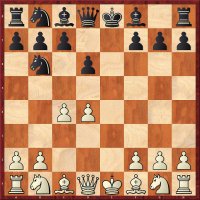 |
|
There is not much theory on this variation and Marin is
breaking new ground. With the help of several innovations,
he succeeds in making the variations playable for Black. |
Skembris:
Caro-Kann B16
1.e4 c6 2.d4 d5
3.Nc3 dxe4 4.Nxe4 Nf6
5.Nxf6+ gxf6
|
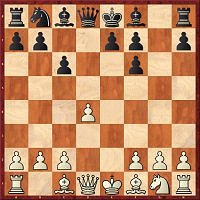 |
|
Skembris provides a complete repertoire from Black’s point
of view. It is also very possible to play for a win with
this ambitious variation. |
Grivas:
Sicilian B33
1.e4
c5 2.Nf3 Nc6 3.d4 cxd4
4.Nxd4 Qb6 5.Nb3 Nf6
6.Nc3 e6 7.g3
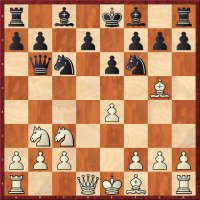 |
|
The Fianchetto Variation is not one of the strongest ways of
opposing the Grivas Sicilian, but as Black you do need to
have a certain amount of basic knowledge. |
Erenburg:
Sicilian B80
1.e4
c5 2.Nf3 d6 3.d4 cxd4 4.Nxd4 Nf6
5.Nc3 a6 6.Be3 e6 7.f3 b5 8.Qd2 b4 9.Nce2
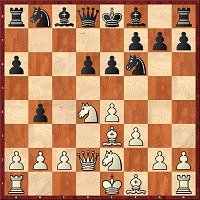 |
|
The knight retreat is not the most popular, but Erenburg
describes a very convincing plan, with which White should
achieve an advantage. |
Kuzmin:
Sicilian B84
1.e4
c5 2.Nf3 d6 3.d4 cxd4 4.Nxd4 Nf6
5.Nc3 a6 6.Be2 (Be3) 6...Nbd7
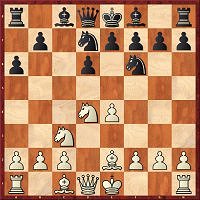 |
|
Since 6.Bg5 Nbd7
looked quite good (CBM 135), it appeared to be an idea to
try out the knight move against other white continuations on
move 6. |
Langrock: French
Defence C11
1.e4 e6 2.d4 d5
3.Nc3 Nf6 4.e5 Nfd7
5.f4 c5 6.Nf3 Nc6 7.Be3
cxd4 8.Nxd4 Bc5 9.Qd2 0-0
10.0-0-0 a6 11.Qf2
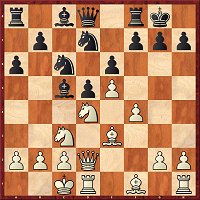 |
|
In recent years 11.Qf2
has turned into the main variation against the black setup.
Langrock shows that here too Black has good chances of
equalising. |
Stohl: Ruy
Lopez C77
1.e4
e5 2.Nf3 Nc6 3.Bb5 a6
4.Ba4 Nf6 5.d3 9.Qd2 0-0
10.0-0-0 a6
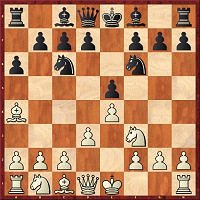 |
|
In the European Championship Ian Nepomniachtichi
demonstrated that the move 5.d3 is not so harmless; with it
he scored 3.5 out of 4. In a two part article Stohl examines
the most important variations. |
Ftacnik: Slav
Defence D12
1.d4
d5 2.c4 c6 3.Nf3 Nf6 4.e3 Bf5
5.Nc3 e6 6.Nh4 Be4
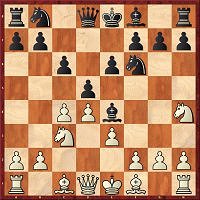 |
|
Black’s bishop move reveals itself as surprisingly annoying,
because White can hardly avoid playing 7.f3. After 7...Bg6
8.Qb3
the move 8...Qc7
is another subtle one, with which Black has been looking
very good of late. |
Karolyi: Queen's
Gambit Accepted D20
1.d4 d5 2.c4
dxc4 3.e3 e5 4.Bxc4 exd4 5.exd4 Bd6
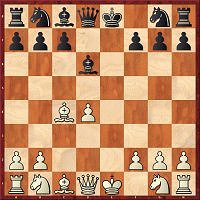 |
|
Karolyi finishes his investigations into the Queen’s Gambit
Accepted with this important variation and thus rounds off a
complete system of play for Black in this classic opening. |
Hazai/Lukacs:
Queen's Gambit D35
1.d4
d5 2.c4 e6 3.Nc3 Be7
4.cxd5 exd5 5.Bf4 Nf6
6.e3 Bf5
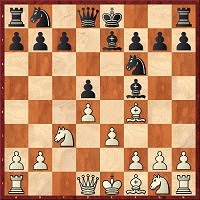 |
|
The refined move order with 3...Be7
leads to the white bishop going to f4 rather than g5. Thus
in the diagram d5 is reliably protected. 7.Qb3
is nevertheless a critical move but is strongly met with
7...Nc6. |
Postny: Queen's
Gambit D39
1.d4 Nf6
2.c4 e6 3.Nf3 d5 4.Nc3 dxc4 5.e4 Bb4
6.Bg5 h6 7.Bxf6 Qxf6
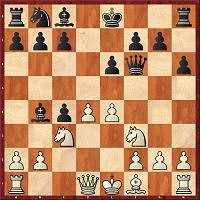 |
|
Until now White has not developed a clear plan against
6...h6 and thus the move of the rook’s pawn has the
potential to replace 6...c5 in the Vienna Variation. |
Schipkov:
Bogo-Indian Defence E11
1.d4 Nf6
2.c4 e6 3.Nf3 Bb4+ 4.Nbd2
0-0 5.a3 Be7 6.e4 d5
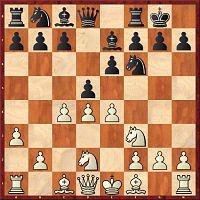 |
|
In this setup which Shipkov recommends for Black, the bishop
pair is retained and the struggle against the white centre
gets going at once. |
|
Krasenkow: Queen's Indian Defence
E12
1.d4 Nf6 2.c4 e6
3.Nf3 b6 4.a3 Bb7
5.Nc3
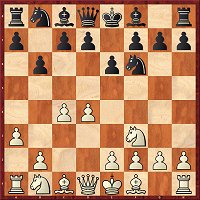 |
|
In the second part of his article from White’s point
of view Krasenkow examines above all the
continuation 5...d5 6.cxd5 exd5, which promises
White a safe advantage. |
|